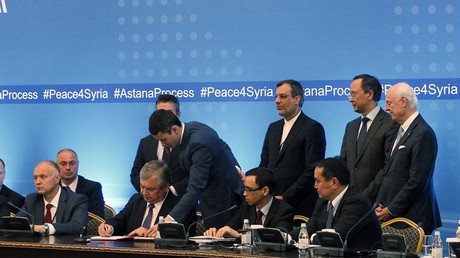UN chief welcomes Syria de-escalation zones brokered by Russia, Turkey & Iran
UN Secretary-General António Guterres has commended the memorandum on four security zones in Syria, which guarantor states Russia, Turkey and Iran agreed upon at Astana peace talks. Saudi Arabia said it was in favor of such zones but wanted more details.
Guterres was “encouraged by the agreement today in Astana, Kazakhstan, by guarantor countries Iran, Russia and Turkey to de-escalate violence in key areas in Syria,” the spokesman for the Secretary-General, Stéphane Dujarric, wrote in a statement released by the UN.
Secretary-General @antonioguterres encouraged by agreement in Astana to de-escalate violence in key areas in #Syriahttps://t.co/XEkc4WI6kT
— UN Spokesperson (@UN_Spokesperson) May 4, 2017
“The Secretary-General welcomes the commitments to ceasing the use of all weapons, particularly aerial assets; to rapid, safe, and unhindered humanitarian access; and to creating conditions for the delivery of medical aid and meeting civilians’ basic needs,” he said.
The UN chief believes it is “crucial to see this agreement actually improve the lives of Syrians.”
The statement also reiterated the UN’s support for a political solution to the Syrian crisis.
Earlier, Staffan de Mistura, the UN special envoy on Syria, praised the deal as “an important, promising, positive step in the right direction in the process of de-escalation of the conflict.”
Meanwhile, Saudi Arabia cautiously welcomed the agreement, saying that “we are for having the stabilization zones” but that they first need to see more details coming from the talks, Reuters reported, citing Saudi Foreign Minister Adel al-Jubeir.
The two-day peace talks that brought the representatives of the Syrian government of President Bashar Assad and the Syrian opposition to the negotiation table were also attended by US and Jordanian observers.
#Astana Agreement pic.twitter.com/qycZoj83eQ
— EHSANI2 (@EHSANI22) May 4, 2017
The delegation of the armed opposition, represented at the meeting by members of some 15 rebel groups, has so far rejected the idea of safe zones, arguing that it endangers Syria’s territorial integrity. They have also refused to accept Iran’s role as a guarantor state of the ceasefire struck in December.
READ MORE: ‘Russia, Iran & Turkey move center of gravity over Syria from Geneva to Astana’
The next round of Astana talks is scheduled for July, according to Kazakh Foreign Minister Kairat Abdrakhamanov.













